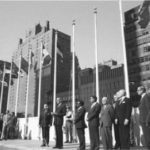 1931 – In northeast China’s Manchuria, what is referred to in world conflict historiography as the Mukden Incident occurs. It was in this border region with Korea that Japanese troops would stage a sabotage. A controlled explosion on the railway line used to transport Japanese soldiers from Korea to China would serve as a pretext for the latter’s invasion by Japan. Invasion that would end in 1945.
1931 – In northeast China’s Manchuria, what is referred to in world conflict historiography as the Mukden Incident occurs. It was in this border region with Korea that Japanese troops would stage a sabotage. A controlled explosion on the railway line used to transport Japanese soldiers from Korea to China would serve as a pretext for the latter’s invasion by Japan. Invasion that would end in 1945.
 1944 – British submarine HMS Tradewind torches and sinks Japanese cargo ship Junyo Maru off the coast of Sumatra in the Indonesian archipelago. There were about 6,000 people on board the Japanese ship, most of whom were Indonesian, British, Dutch, and American prisoners who were tortured inside the ship by the Japanese. As a result of the drowning, 5,500 people would lose their lives, while another 500 would end up offshore to be transported to Burma.
1944 – British submarine HMS Tradewind torches and sinks Japanese cargo ship Junyo Maru off the coast of Sumatra in the Indonesian archipelago. There were about 6,000 people on board the Japanese ship, most of whom were Indonesian, British, Dutch, and American prisoners who were tortured inside the ship by the Japanese. As a result of the drowning, 5,500 people would lose their lives, while another 500 would end up offshore to be transported to Burma.
 1961 – Dag Hammarskjold, Secretary-General of the United Nations, dies at the age of 56. Hammarskjold would crash along with 15 other people on board the DC-6 transport aircraft. This aircraft would fly over the territory of Zambia, to go to Congo where, Hammarskjold himself would negotiate a possible ceasefire for the warring parties there. The causes of the crash remain unclear.
1961 – Dag Hammarskjold, Secretary-General of the United Nations, dies at the age of 56. Hammarskjold would crash along with 15 other people on board the DC-6 transport aircraft. This aircraft would fly over the territory of Zambia, to go to Congo where, Hammarskjold himself would negotiate a possible ceasefire for the warring parties there. The causes of the crash remain unclear.
 1968 – World-famous basketball player Toni Kuko Lind is born in Split, Croatia (then Yugoslavia). During his 20-year career, Kukoç would make his debut with a number of well-known teams in this sport, such as Jugoplastika, Benetton Treviso, and especially the Chicago Bulls, where he would receive the greatest fame alongside Michael Jordan. While at the 1988 Seoul Olympics, the 1989 and 1991 Eurobasket, he would be proclaimed champion of the Yugoslav national team. After that he would be declared champion again with the Croatian national team in Barcelona 1992, FIBA 1994 and Eurobasket 1995.
1968 – World-famous basketball player Toni Kuko Lind is born in Split, Croatia (then Yugoslavia). During his 20-year career, Kukoç would make his debut with a number of well-known teams in this sport, such as Jugoplastika, Benetton Treviso, and especially the Chicago Bulls, where he would receive the greatest fame alongside Michael Jordan. While at the 1988 Seoul Olympics, the 1989 and 1991 Eurobasket, he would be proclaimed champion of the Yugoslav national team. After that he would be declared champion again with the Croatian national team in Barcelona 1992, FIBA 1994 and Eurobasket 1995.
 1973 – The states of the Bahamas, East and West Germany, are admitted to the United Nations. Due to the tension and a slightly negative climate in the political and economic relations between Berlin and Bonn, the UN decided to accept these two states unconditionally within the same nation, thus avoiding a possible military confrontation between them in the years ongoing. The admission of the two Germanys within this organization would guarantee a safe and peaceful union 17 years later.
1973 – The states of the Bahamas, East and West Germany, are admitted to the United Nations. Due to the tension and a slightly negative climate in the political and economic relations between Berlin and Bonn, the UN decided to accept these two states unconditionally within the same nation, thus avoiding a possible military confrontation between them in the years ongoing. The admission of the two Germanys within this organization would guarantee a safe and peaceful union 17 years later.
 1974 – Hurricane Fifi in Central Honduras destroys nearly half the country, killing at least 10,000 people. About 20,000 others would be injured, and thousands more homeless. The wind would blow at a speed of 175 km per hour. While the economic losses would reach the figure of 2 billion dollars. Hurricane Fifi would be rated by meteorologists as one of the most devastating in the Caribbean region.
1974 – Hurricane Fifi in Central Honduras destroys nearly half the country, killing at least 10,000 people. About 20,000 others would be injured, and thousands more homeless. The wind would blow at a speed of 175 km per hour. While the economic losses would reach the figure of 2 billion dollars. Hurricane Fifi would be rated by meteorologists as one of the most devastating in the Caribbean region.
 2001 – In the United States, a week after the 9/11 attacks, another series of terrorist attacks would alarm the world superpower. Exactly what would also be classified as anthrax bacterial attacks. Dozens of anonymous envelopes would be distributed across the US where dust with the deadly anthrax bacterium exploded inside when opened. As a result, 5 people would lose their lives and 17 would be seriously injured. No one would take responsibility for these attacks.
2001 – In the United States, a week after the 9/11 attacks, another series of terrorist attacks would alarm the world superpower. Exactly what would also be classified as anthrax bacterial attacks. Dozens of anonymous envelopes would be distributed across the US where dust with the deadly anthrax bacterium exploded inside when opened. As a result, 5 people would lose their lives and 17 would be seriously injured. No one would take responsibility for these attacks.
 2014 – A popular referendum in Scotland to declare independence from the United Kingdom fails, leaving the country permanently within British borders. With a turnout of 3.6 million people, nearly 2 million of them would vote against separation from the British crown and only 1.6 million would vote in favor. The referendum would be hailed by British analysts as a sign of official London triumph over possible separatist movements in Scotland and Ireland.
2014 – A popular referendum in Scotland to declare independence from the United Kingdom fails, leaving the country permanently within British borders. With a turnout of 3.6 million people, nearly 2 million of them would vote against separation from the British crown and only 1.6 million would vote in favor. The referendum would be hailed by British analysts as a sign of official London triumph over possible separatist movements in Scotland and Ireland.






